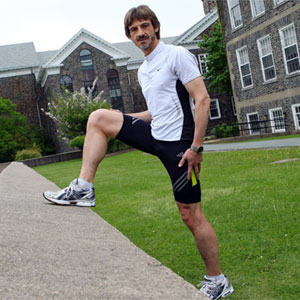 |
| Health psychologist Michael Vallis is interested in the areas of motivational enhancement and behaviour modification. (Nick Pearce Photo) |
Hands up if these scenarios are familiar:
- You get the exercise bike/treadmill/elliptical you wanted for Christmas, but by April, the machine has been moved to the basement for lack of use.
- You sign up for the weight loss plan that promises pounds will fly off your hips without you having to give up the foods you love. It works for awhile, until one day you discover you weigh more than you ever did.
- You decide to give up smoking, but put it off until next week when you’re not so stressed.
Motivation expert Michael Vallis say most people fall into a pattern. They start out with the best intentions and do well for a little while … but then fall back into old habits. It’s a classic health trap: two steps forward, three steps back.
And that’s a problem. People end up feeling bad about themselves. Moreover, the two-steps-forward-three-steps-back dance ends up increasing the health problems the behavioral changes were supposed to address in the first place.
But people concerned about their health can not only start a new behavior but continue it if they’re honest and realistic about their motivation, says Dr. Vallis, health psychologist with Capital Health and professor of psychiatry and psychology at �鶹��ý��Դ University. His main area of expertise is in adult health psychology, with an emphasis on diabetes, gastroenterology, cardiovascular risk and obesity.
“People really need to identify personal and meaningful motivations,” says Dr. Vallis, 53, a father of three children. “What’s going to keep you going when it gets hard?” (Some questions to ask yourself: Do you think your behaviour is a problem? How distressed are you about your behaviour? Are you interested in doing anything to change this behaviour? Are you ready to take action now?)
Next, the person has to change their behavior by laying out “smart, specific goals.” In other words, you can’t just resolve to “get more active,” you’ve got to identify when and for how long you’ll do an exercise, whether it’s yoga or swimming or cycling. “Get more active” turns into “I’m going to go for a brisk, hour-long walk on Thursday night at 6 p.m.”
The third part of making change stick is to recognize the role emotion plays in your health and coming up with strategies to cope without resorting to destructive behavior, for example, eating when you’re feeling down, or lighting up a cigarette when you’re in a social situation.
“Stress is what is going to knock people off the best-laid plans,” says Dr. Vallis. “All these unhealthy things—eating the whole carton of ice cream, drinking, smoking—are ways of medicating anxieties.
“If an unhealthy behavior serves a purpose for the patient, it’s important to ‘replace the function’ of that behavior. So, an emotional eater will often be unsuccessful at weight loss until they develop alternative methods of coping with their emotions other than eating.”
The Dartmouth native not only talks the talk, he runs. When his father died of cardiovascular disease at the age of 57, he realized he was at risk for heart disease, too. He started running when he was in graduate school and now “can’t not run—it’s part of my lifestyle.”
He says health professionals have to be good role models; it’s no longer acceptable for nurses or doctors to preach healthy living if they’re eating poutine in the hospital cafeteria or smoking on the sidewalk between patient appointments. He’s been doing training sessions with health professionals to get his message on motivation out to more people than he could reach one on one.
For more information on making a health plan and sticking to it, check out the website, knowyourratio.com.
Obesity boot campObesity boot camp sounds tough, and it is. Even so, participants aren’t expected to do lunges, squats and jumping jacks. But they will be asked to commit to lifestyle changes that could profoundly affect their health. Pioneered by the Capital Health’s Obesity Network, the pilot program will kick off in July with employees of Halifax’s hospitals and health centres. Organizers hope to launch the second session for the general public in September. “We’ve been calling them boot camps—but ‘boot camps’ are in quotations,” says Diana Lawlor, a nurse practitioner with the Obesity Network. “The camps will be psychology-based. For example, we’ll be examining why so many people are obese. What are the psychological traps to weight loss? How do we overcome them? And how do people commit to change?” The camps will consist of four sessions a year for 100 to 200 people per camp. Along with Ms. Lawlor, the camps will be facilitated by health psychologist Michael Vallis, endocrinologist Tom Ransom, surgeon Jim Ellsmere and clinical dietician Janet Plowman. If interested in participating, contact Diana Lawlor by e-mailing Diana.Lawlor@cdha.nshealth.ca or keep an eye on the ��as details become available. |
��
